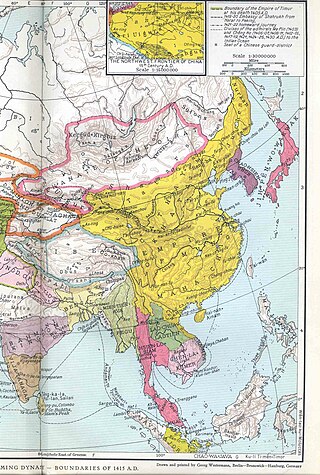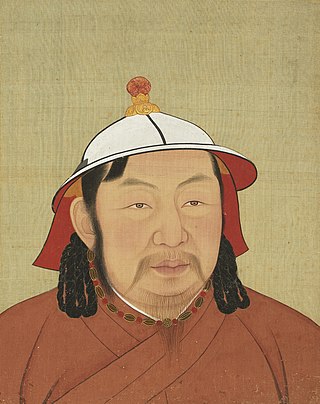| |||||
| Decades: | |||||
|---|---|---|---|---|---|
| See also: | Other events of 1821 History of China • Timeline • Years | ||||
Events from the year 1821 in China .
| |||||
| Decades: | |||||
|---|---|---|---|---|---|
| See also: | Other events of 1821 History of China • Timeline • Years | ||||
Events from the year 1821 in China .

The Ming dynasty, officially the Great Ming, was an imperial dynasty of China, ruling from 1368 to 1644 following the collapse of the Mongol-led Yuan dynasty. The Ming dynasty was the last imperial dynasty of China ruled by the Han people, the majority ethnic group in China. Although the primary capital of Beijing fell in 1644 to a rebellion led by Li Zicheng, numerous rump regimes ruled by remnants of the Ming imperial family—collectively called the Southern Ming—survived until 1662.

The Legislative Yuan is the unicameral legislature of the Republic of China (Taiwan) located in Taipei. The Legislative Yuan is composed of 113 members, who are directly elected for four-year terms by people of the Taiwan Area through a parallel voting system.

The imperial examination was a civil-service examination system in Imperial China administered for the purpose of selecting candidates for the state bureaucracy. The concept of choosing bureaucrats by merit rather than by birth started early in Chinese history, but using written examinations as a tool of selection started in earnest during the Sui dynasty (581–618) then into the Tang dynasty of 618–907. The system became dominant during the Song dynasty (960–1279) and lasted for almost a millennium until its abolition during the late Qing dynasty reforms in 1905. Aspects of the imperial examination still exist for entry into the civil service of contemporary China, in both the People's Republic of China (PRC) and the Republic of China (ROC).

The Control Yuan is the supervisory and auditory branch of the government of the Republic of China (Taiwan).
The Examination Yuan is the civil service commission branch, in charge of validating the qualification of civil servants, of the government of the Republic of China (Taiwan). It has a president, a vice president, and seven to nine members, all of whom are nominated by the president of the republic and confirmed by the Legislative Yuan for four-year terms according to Republic of China laws.

Jinshi was the highest and final degree in the imperial examination in Imperial China. The examination was usually taken in the imperial capital in the palace, and was also called the Metropolitan Exam. Recipients are sometimes referred to in English-language sources as Imperial Scholars.

Toghon Temür, also known by his temple name as the Emperor Huizong of Yuan bestowed by the Northern Yuan dynasty and by his posthumous name as the Emperor Shun of Yuan bestowed by the Ming dynasty, was the last emperor of the Yuan dynasty and later the first emperor of the Northern Yuan dynasty. Apart from Emperor of China, he is also considered the last Khagan of the Mongol Empire. He was a son of Kusala.

Buyantu Khan, born Ayurbarwada, also known by the temple name Renzong (Emperor Renzong of Yuan, was the fourth emperor of the Yuan dynasty of China. Apart from Emperor of China, he is regarded as the eighth Great Khan of the Mongol Empire, although it was only nominal due to the division of the empire. His name means "blessed/good Khan" in the Mongolian language. His name "Ayurbarwada" was from a Sanskrit compound "Āyur-parvata", which means "the mountain of longevity", in contrast with Emperor Wuzong's name Qaišan.
Yuan may refer to:

The Government of the Republic of China is the national government of the Republic of China (ROC) whose de facto territory currently consists of Taiwan, Penghu, Kinmen, Matsu, and other island groups in the "free area". Governed by the Democratic Progressive Party (DPP) since 2016, the president is the head of state. The government consists of the presidency and five branches (Yuan): the Executive Yuan, Legislative Yuan, Judicial Yuan, Examination Yuan, and Control Yuan.
The law of the Republic of China as applied in Taiwan, Penghu, Kinmen and Matsu is based on civil law with its origins in the modern Japanese and German legal systems. The main body of laws are codified into the Six Codes:

The Yuan dynasty, officially the Great Yuan, was a Mongol-led imperial dynasty of China and a successor state to the Mongol Empire after its division. It was established by Kublai, the fifth khagan-emperor of the Mongol Empire from the Borjigin clan, and lasted from 1271 to 1368. In Chinese historiography, the Yuan dynasty followed the Song dynasty and preceded the Ming dynasty.

Chia Ching-teh was a politician in the Republic of China. He was the Vice Premier in 1949.
Events from the year 1966 in Taiwan, Republic of China. This year is numbered Minguo 55 according to the official Republic of China calendar.
Events from the year 1931 in Taiwan, Empire of Japan.

The 1909 Chinese provincial elections were held to elect the members of the Provincial Assemblies of China. The election was held between April and June 1909 in the 22 provinces of China as part of the New Policies as a move toward constitutional monarchy. The Provincial Assemblies were convened on 14 October 1909 and were responsible for electing half of the members of the imperial Advisory Council convened subsequently in 1910. These provincial assemblies survived even after the 1911 Xinhai Revolution that founded the Republic of China and replaced the Qing Empire. They were ordered to dissolve by the President Yuan Shikai.

Huang Jong-tsun is a Taiwanese politician and psychologist who serves as the current President of the Examination Yuan. Prior to assuming his current role, Huang had served as President of China Medical University from 2005 to 2014 and Minister of Education from 2002 and 2004. He is the first President of the Examination Yuan not affiliated with any political party.

The administration of territory in dynastic China is the history of practices involved in governing the land from the Qin dynasty to the Qing dynasty (1636–1912).